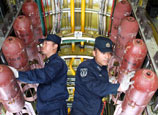
With high school graduates emerging as a conspicuous group pursuing study abroad in recent years, the internationalization of fundamental education has come into the spotlight.
Statistics from the Ministry of Education indicate that in 2011, 76,000 high school graduates enrolled in undergraduate programs overseas, and the number has increased by more than 20 percent annually over the last several years.
About 100 principals and deputy principals from more than 80 top middle and high schools nationwide, along with pedagogical experts from prestigious institutions, gathered at Zhengzhou Middle School on Thursday to share their insight on the "internationalization of China's fundamental education", the theme of the 2013 21st Century National Summit Forum of Top Middle School Principals.
Wang Ximin, deputy editor-in-chief of China Daily, emphasized the importance of having professionals with international horizons for China's current integration into the global community.
"The cultivation of talent with international competitiveness is vital to the country's endeavor to further engage in cross-cultural exchanges and economic communication," Wang said.
Qi Yeguo, a professor at East China Normal University, sees a growing trend among Chinese students of studying abroad at an earlier age. But he believes studying abroad serves only one of the multiple aspects of internationalizing fundamental education in China.
"Compared with the rocketing number of high school graduates studying abroad, the cultivation of their comprehension of international cultural diversity is limited, while critical," Qi said.
Bi Cheng, a researcher at the National Institute of Education Sciences and vice-president of the National Institute of Principals' Development, spoke of the significance of furthering educational reform at the fundamental level.
"The key to an internationalized education should be based on internationalized standards of teaching staff and curriculum," Bi said. "What we need is optimization of the teaching system as a whole rather than relying on studying abroad or joint programs to breed talent with true international horizons."
Gong Yafu, president of the National Association of Foreign Languages, said an internationalized education should explore aspects beyond curricula to focus more on character building and training in ways of thinking.
"To some extent, it is time for educationalists to reform the existing theories, concepts and objectives of education in order to better cope with updated requirements for talent in the vicissitudes of the international socioeconomic landscape," Gong said.
Mu Jielin, associate-counsel at the department of cultural and educational experts at the State Administration of Foreign Experts Affairs, explained to the audience existing State policies to better facilitate and regulate the procedure for hiring quality foreign faculty members to enhance Chinese students' international exposure.
Thursday's event coincided with the opening of the 2013 China Daily 21st Century National Annual Conference of English Education and the start of the Henan provincial contest of the 21st Century Cup National Speaking Competition.
Mu was joined at the opening ceremony by Liu Dong, deputy mayor of Zhengzhou; Zhang Jianguo, head of Zhengzhou High & New Technology Industries Development Zone; and Zhao Guohe, associate-counsel at the Education Department of Henan province.
















 Migrant children’s dream of stage
Migrant children’s dream of stage


![]()
